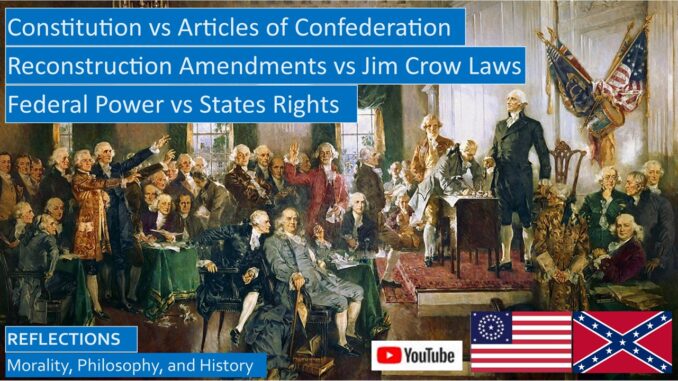
What were the tensions between states’ rights and federal powers early in our history? How were these tensions reflected in the founding documents of our American Republic?
How did the tensions between states’ rights and federal powers, and between Jim Crow segregation and civil rights, evolve before and after the Civil War?
How were the Founding Fathers influenced by Enlightenment philosophers and Biblical principles when drafting our founding documents?
How did slavery affect American history from the days of our Founding Fathers to the Civil War and later the Civil Rights movement?
STATES’ RIGHTS VERSUS FEDERAL AUTHORITY
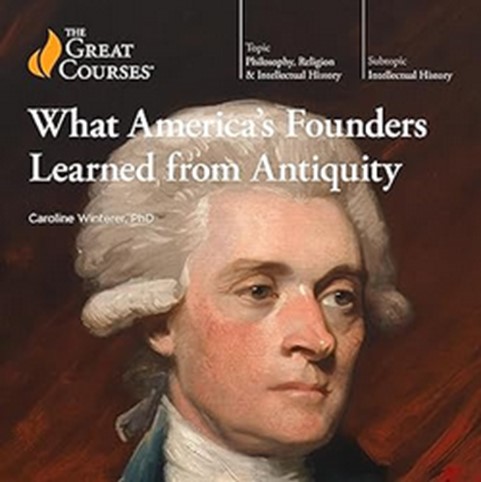
The question of states’ rights, or how much power should be delegated to the states, has been an issue throughout American history. The United States of America was initially a loose collection of thirteen independent and very different colonies, some agrarian colonies with massive plantations, some maritime colonies dependent on trade with Europe, some large, some small. During the Revolutionary War, encouraged by Benjamin Franklin, delegations from each state met in the First Continental Congress to coordinate their wartime efforts.
After the end of the war, these thirteen colonies formed a similar loose confederation of states under the Articles of Confederation, but after a decade of ineffective government, influential national leaders drafted the Constitution, founding a strong national government that nevertheless delegated local governmental functions to the states to a greater degree than the more centralized European monarchies.
THE COLONIES REBEL IN THE REVOLUTIONARY WAR
These colonists who rebelled against the British desired a weak national government to prevent injustices like those suffered by the colonies under the British monarchy. The European Seven Years War between France and England led to the French and Indian War in the colonies, won by overwhelming British military force. The members of Parliament thought it was only fair to tax the colonies to reduce the debt incurred to fight this war. This sudden imposition of taxes angered the colonists, eventually leading to the Boston Tea Party.
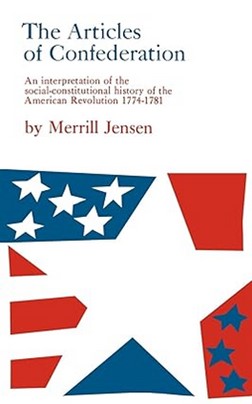
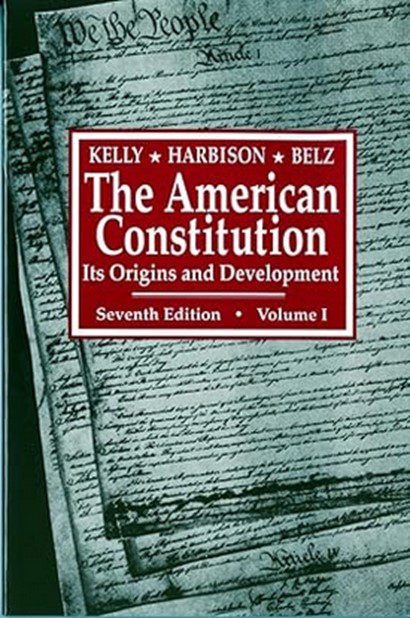
The British Parliament angered the colonial political leaders: state legislatures were convened at awkward times and places, and enacted legislation required the King’s signature. The colonists felt that their rights were violated when British tax agents were allowed to search without a warrant, when British troops were forcibly quartered in private homes, and when the British navy impressed sailors from coastal areas. These and other abuses caused many colonists to despise all forms of centralized government.
The Second Continental Congress drafted the Declaration of Independence on the eve of the American Revolution, rebelling against the taxes and restrictions on trade and colonial government imposed by Parliament. Many states sent multiple delegates to the Continental Congress, but each state had only one vote to encourage unity in the war effort. The delegates to the Continental Congress included many leaders of the later Constitutional government, including George Washington, John Jay, John Adams, and Thomas Jefferson, as well as Benjamin Franklin and John Hancock.
DRAFTING THE ARTICLES OF CONFEDERATION
The drafters of the Articles of Confederation saw no need to create a strong national government after the British defeat: the colonies would coordinate their efforts in a loose Confederation modeled after the wartime Continental Congress. After the British defeat, this Congress drafted the Articles of Confederation, which were not ratified by all the states until 1781. These Articles also gave one vote to each state delegation of between two and seven members selected by the state legislatures. Only the federal government could wage war or conduct foreign policy, but it relied on the states to provide funding and militia. The President had limited powers, in the eight years the Confederation existed there were ten Presidents. Other than John Hancock, these Presidents are not names many are familiar today. Although many later served as governors, judges, and members of Congress, none were nationally prominent.
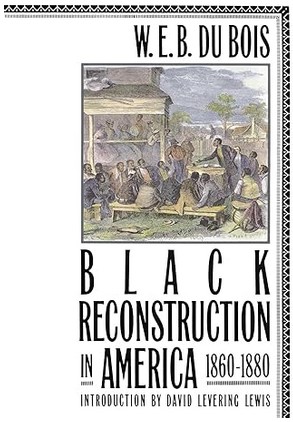
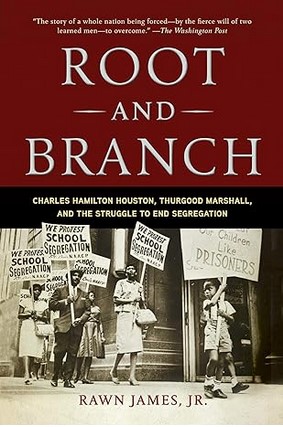
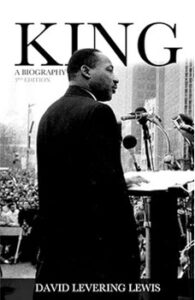
The national government under the Articles of Confederation was weak and ineffective. Rarely did the delegates from the nine states needed to form a quorum attend the Congressional sessions. The only major legislation passed was the Northwest Ordinance of 1787, which formed the Northwest Territory including the modern states of Ohio, Indiana, Illinois, Wisconsin, Michigan, and part of Minnesota. The ratification of the Treaty of Paris formally ending the Revolutionary War almost failed for lack of a quorum. Without the power to tax or control commerce, the Confederation could not honor the national debt and could not encourage trade. Squabbles between the states over trade and navigation were frequent. The credit of our new nation was so unsound that even France and Holland, our Revolutionary allies, refused to loan our government money.
These weaknesses exposed our new nation to dangers, there were justified fears that European nations would take advantage of our weak national government that lacked a national army, as several incidents reveal. Daniel Boone of Kentucky opened negotiations with the Spanish to make the state a Spanish colony to gain an outlet for the state’s goods. George Washington dissuaded veterans from rising up in mutiny when Congress failed to provide them with their back pay and pensions. The state of Massachusetts wouldn’t allow out-of-state militia on her soil to help squelch Shay’s Rebellion, a debtors’ uprising, and Spanish authorities denied passage to American goods down the Mississippi River.
CONVENING THE CONSTITUTIONAL CONVENTION
In September 1786, delegates from five states convened in the Annapolis Convention to discuss reversing protectionist trade barriers each state had erected against the others. After much discussion, these delegates voted to invite delegations from all states to a larger Constitutional Convention in Philadelphia. The calling of this Convention was endorsed by the Confederate Congress with the proviso that they would only discuss amending the Articles of Confederation.


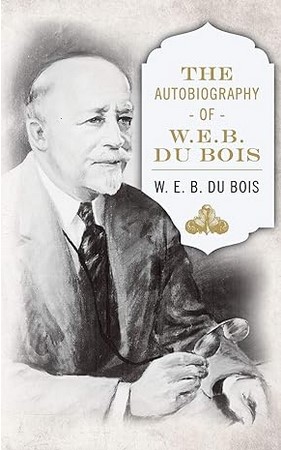 After much discussion, the delegates proposed to replace rather than amend the Articles of Confederation. Secrecy surrounded the proceedings; windows were closed during the sweltering summer as the delegates debated from May to September 1787. Not only did this Convention predate the invention of air conditioning, it preceded the invention of electrical fans.
After much discussion, the delegates proposed to replace rather than amend the Articles of Confederation. Secrecy surrounded the proceedings; windows were closed during the sweltering summer as the delegates debated from May to September 1787. Not only did this Convention predate the invention of air conditioning, it preceded the invention of electrical fans.
The Constitution corrected the many weaknesses of the Confederation. Congressmen now swear allegiance to the United States rather than to their native states, as was done under the Articles. The Constitution grants the Federal government not only the power to levy taxes, but also to collect them, as well as granting it sole control over trade and commerce. The Constitution establishes a Federal court system that can override state court decisions if there is a conflict. The US Congress, unlike the Confederation Congress, can pass routine legislation with a simple majority vote. Unlike the unicameral Confederation Congress, the Constitution created a bicameral Congress, with a Senate with two Senators selected by the state legislatures at first, but with a House of Representatives with proportional representation based on population.
The Declaration of Independence protested against taxation without representation, so the Constitution stipulates that all appropriation money bills originate in the more representative House. The Constitution compromises on the Declaration’s objection to the required Royal assent to legislation enacted: although the President can veto legislation, Congress can override his veto. But the Constitution rejects the Declaration’s grievance against standing armies. Indeed, the President is the Commander-in-Chief.
The most notable difference between the Articles of Confederation and the Constitution is that while the Articles state:
“Each state retains its sovereignty, freedom, and independence, and every power, jurisdiction, and right which is not by the confederation not expressly delegated to the United States, in Congress assembled.”
Neither the Constitution nor the Bill of Rights recognizes this sovereignty. However, the last two amendments in the Bill of Rights proclaim that:
“The enumeration in the Constitution of certain rights shall not be construed to deny or disparage others retained by the people.”
CONSTITUTION RATIFIED WITH BILL OF RIGHTS PROMISED
Since the Constitution was such a radical departure from the Articles of Confederation, its approval was not certain, and it was quite controversial. The Constitution was submitted to the Confederate Congress, and although it replaced rather than revised the Articles, the Congress voted unanimously to forward it to the thirteen states for their ratification. Unlike the Articles, the Constitution did not require unanimous consent for its adoption. Instead, the Constitution stipulated that it would take effect when two-thirds, or nine of the state ratifying conventions organized by the state legislatures, approved it.
Anti-Federalists in several states persuaded their ratifying conventions to make their ratification conditioned on the Congress guaranteeing certain citizen rights. James Madison, a future President, studied their objections, and the rights delineated in the Virginia Declaration of Rights, Magna Carta, English Bill of Rights, and the Northwest Ordinance. Madison proposed about twenty articles, which Congress summarized in twelve amendments, of which ten were ratified by the states as the Bill of Rights by 1791.
The Bill of Rights guarantees many of the individual rights demanded by the Declaration of Independence. These rights include prohibiting the quartering of troops in private homes, and requiring that police can conduct a search if a court issues a search warrant. Although the Constitution guarantees a jury trial in criminal cases, the Bill of Rights goes further by allowing a jury trial in civil cases and by guaranteeing a fair and speedy trial on location, and reasonable bonds and fines.
One grievance in the Declaration of Independence that was not mentioned in either the Constitution or the Bill of Rights was the impressment of sailors into the British Navy. This was not necessary since the small Continental Navy had been disbanded at the end of the Revolutionary War. However, in 1794 the US Navy was revived when six frigates were built to fight the Barbary pirates preying on both American and European shipping.
Slavery was viewed by the Founding Fathers as both an embarrassment and a dying institution when the Constitution was adopted. However, the vast plantations in the Deep South were vital to the Southern economies, so compromises were made regarding slavery, although the word slavery never appears in the Constitution. Although the federal government was barred from banning the transatlantic slave trade for twenty years, Congress promptly banned this trade immediately after this deadline passed.
How would slaves be counted for Congressional races? The Three-Fifths Compromise ensured that every five slaves would count as three persons in elections for the House of Representatives, even though the slaves themselves could not vote.[1] The Confederate Deep South states had dominated Congress and US politics before the Civil War, and there was concern that this stranglehold would only increase after the Civil War when the emancipated slaves would count as one vote, even if eventual Jim Crow legislation would deny blacks the vote. The Fourteenth Amendment included provisions that denied representation to the Southern states if they denied their black citizens their right to vote, as well as forbidding the repudiation of federal debt, though these provisions were never enforced.
Unenforced Sections of the 14th Reconstruction Amendment: Public Debt and Insurrection
https://seekingvirtueandwisdom.com/unenforced-sections-of-the-14th-reconstruction-amendment-public-debt-and-insurrection/
https://youtu.be/GoDYRQzFRhI
A curious story is how the last of Madison’s Bill of Rights amendments was passed over two centuries later as the 27th Amendment. A college professor unwisely gave a C grade for a student paper that implausibly suggested that ratification was possible. This prompted the student to embark on a multi-year letter writing campaign that eventually resulted in the passage of this amendment, resulting in a regrading of his course many decades later.
YOUTUBE
INSPIRATION FOR OUR FOUNDING DOCUMENTS
Many evangelical Christians want history to spread the news that the Founding Fathers were primarily interested in founding a Christian nation, founded on Biblical principles. Although it is historically true that the Great Awakening revivals before and during the early years of our Republic helped ensure that America would hold fast to religion while anti-clericalism grew in Europe, history also reveals that our Founding Fathers, although not anti-clerical, were not evangelical Christians, but instead were mainstream philosophical deists who ensured the separation of church and state. Deism was the belief that God, when creating the Universe, also created the natural and scientific laws that guided the continuing functioning of the universe. In essence, God created the watch with everlasting springs, so that the eternal watch would tick unattended until the end of time.
Thomas Jefferson, the initial drafter of the Declaration of Independence, was critical of organized religion, interested primarily in reason and ethics. He crafted his individual Bible where only the ethical teachings of the Historical Jesus remained, he cut out all those unscientific miracles. Jefferson was inspired by the classical Stoic and Epicurean philosophers, especially Epictetus and Epicurus.
Epictetus, Stoic Philosopher
http://www.seekingvirtueandwisdom.com/epictetus-discourses-blog-1/
http://www.seekingvirtueandwisdom.com/epictetus-discourses-blog-2/
https://youtu.be/Dhd543kov-E
Was Epicurus Really a Stoic-Lite Philosopher? Were all Epicureans hedonists?
http://www.seekingvirtueandwisdom.com/was-epicurus-really-a-stoic-lite-philosopher-were-all-epicureans-hedonists/
Epicurus, Aristippus, and Lucretius: History of Epicurean Philosophy
http://www.seekingvirtueandwisdom.com/epicurus-aristippus-and-lucretius-history-of-epicurean-philosophy/
Epicurus, Aristippus, and Lucretius: Were the Epicureans Stoic-Lite Philosophers?
https://youtu.be/49Qv3Be86Jw
Marcus Aurelius Blog 2, Others will be irritating, but not I!
http://www.seekingvirtueandwisdom.com/marcus-aurelius-blog-2-others-will-be-irritating-but-not-i/
Marcus Aurelius Blog 3 Genuine Friends Don’t Keep Scorecards
http://www.seekingvirtueandwisdom.com/marcus-aurelius-blog-3-genuine-friendships-have-no-scorecards/
Marcus Aurelius Blog 4 Be critical of yourself, be gracious towards your neighbor
http://www.seekingvirtueandwisdom.com/marcus-aurelius-blog-4-be-critical-of-yourself-be-gracious-towards-your-neighbor/
Marcus Aurelius Blog 5 Seeing life’s misfortunes through the eyes of our neighbor
http://www.seekingvirtueandwisdom.com/marcus-aurelius-blog-5-seeing-lifes-misfortunes-through-the-eyes-of-our-neighbor/
Marcus Aurelius: Meditations: Stoic View of Life
https://youtu.be/0qHpReZYhv4
Seneca, Moral Epistles, Blog 1, Living Well, Dying Well
http://www.seekingvirtueandwisdom.com/seneca-moral-epistles-blog-1-living-well-dying-well/
Seneca, Moral Epistles, Blog 2, Stoicism and Living a Godly Life
http://www.seekingvirtueandwisdom.com/seneca-moral-epistles-blog-2-stoicism-and-living-a-godly-life/
Seneca, Moral Epistles, Blog 3, Loving Philosophy, Loving God, Loving our Neighbor
http://www.seekingvirtueandwisdom.com/seneca-moral-epistles-blog-3-loving-philosophy-loving-god-loving-our-neighbor/
Seneca, Moral Epistles, Blog 4, Stoic Concepts of Virtue and the Good
http://www.seekingvirtueandwisdom.com/seneca-moral-epistles-blog-4-stoic-concepts-of-virtue-and-the-good/
Seneca, Moral Epistles, Blog 5, On the Benefits of Friends and Keeping Score
http://www.seekingvirtueandwisdom.com/seneca-moral-epistles-blog-5-on-the-benefits-of-friends-and-keeping-score/
Seneca, Moral Epistles, Blog 6, Stoicism and the Golden Rule
http://www.seekingvirtueandwisdom.com/seneca-moral-epistles-blog-6-stoicism-and-the-golden-rule/
Seneca, Moral Epistles, Blog 7, Precious Stoic Nuggets of Wisdom
http://www.seekingvirtueandwisdom.com/seneca-moral-epistles-blog-7-precious-stoic-nuggets-of-wisdom/
Seneca the Younger, Roman Stoic Philosopher, Short Biography and Sayings
https://youtu.be/wgD8skYi3I0
Seneca: Stoic Sayings on Virtue, Friendship, Pleasure, Joy, and Philosophy
https://youtu.be/m4mcP2F9c4w
James Madison, the initial drafter of the Constitution, like many other Founding Fathers, studied many of the classical Greek and Roman Platonic and Stoic philosophers, and the classical histories of Greece and Rome by ancient authors such as Herodotus, Thucydides, Xenophon, Plutarch, Livy, Tacitus, Lucretius, and many more. Many of the Federalist Papers arguing for the adoption of the Constitution were written under classical pennames. The Founding Fathers were especially inspired by the ancient biographer Plutarch, and the Enlightenment philosophers John Locke and Montesquieu.[2]
Summary of Greco-Persian Wars, Herodotus, Plutarch and Aeschylus Celebrate Greek Victory
https://seekingvirtueandwisdom.com/summary-of-greco-persian-wars-ancient-historians-herodotus-plutarch-and-aeschylus-celebrate-greek-victory/
https://youtu.be/frBzSQVala4
Summary of the Peloponnesian Wars Between Athens and Sparta
https://seekingvirtueandwisdom.com/summary-of-the-peloponnesian-wars-between-athens-and-sparta/
https://youtu.be/SW9Zq4IiLF0
Comeback of Alcibiades in Peloponnesian War, according to Plutarch, Thucydides, and Xenophon
https://seekingvirtueandwisdom.com/comeback-of-alcibiades-in-peloponnesian-war-according-to-plutarch-thucydides-and-xenophon/
https://youtu.be/b7QLp1HrOMs
Thirty Tyrants Ruling Athens After Spartan Victory in the Peloponnesian Wars
https://seekingvirtueandwisdom.com/thirty-tyrants-ruling-athens-after-spartan-victory-in-the-peloponnesian-wars/
https://youtu.be/rrcwdHyvIEg
STATES’ RIGHTS BEFORE, DURING, AND AFTER THE CIVIL WAR
Although our first President George Washington naively hoped that political parties would not develop in our fledging republic, a two-party political system quickly evolved. The Federalist Party led by Alexander Hamilton, centered in New England, believed in a strong federal government that encouraged trade and manufacturing. The Democratic-Republican Party led by Thomas Jefferson, centered in the agrarian Southern States, believed in states’ rights where the states would be granted all powers not specifically assigned to the federal government.
Tensions increased between the Northern and Southern states after northern abolitionists agitated for the end of slavery in the 1830’s. The first American President who vowed to save the Union was not Abraham Lincoln in 1861, but was rather Andrew Jackson in 1832. At that time, a major source of revenue for the federal government was tariffs. In response to a tariff that threatened its plantation economy, South Carolina declared that any state could unilaterally nullify federal legislation of its choosing, it could also choose to secede from the Union. Jackson threatened armed federal intervention to prevent South Carolina from seceding from the Union, and Daniel Webster delivered a speech recited by schoolchildren as late as the twentieth century: “Liberty and Union, now and forever, one and inseparable!”
Many people still believe the false Lost Cause narrative that the Civil War was not fought over slavery but was fought to defend states’ rights. The problem with this narrative is that the seceding conventions of the Southern states declared that they did so to protect slavery. So, states’ rights issue is a dog whistle synonymous with protecting slavery.
Although this channel does not focus on the history of battles, but rather the social trends that accompany war, we decided to reflect briefly on the Civil War battles since there were so many paintings and lithographs documenting the struggles of that great war.
How Did the Speeches of Daniel Webster Inspire the North to Fight To Preserve the Union?
https://seekingvirtueandwisdom.com/how-did-the-speeches-of-daniel-webster-inspire-the-north-to-fight-to-preserve-the-union/
https://youtu.be/etLbkY_zgY0
Why Were Union Soldiers in the Civil War Willing to Fight to Preserve the Union?
https://seekingvirtueandwisdom.com/why-were-union-soldiers-in-the-civil-war-willing-to-fight-to-preserve-the-union/
https://youtu.be/0aak9Mtt0eI
We Fought the Civil War to Preserve Slavery, Confederate Leaders Proclaimed
https://seekingvirtueandwisdom.com/we-fought-the-civil-war-to-preserve-slavery-confederate-leaders-proclaimed/
https://youtu.be/vBt81M6EWk0
Civil War Struggle Through Paintings
http://www.seekingvirtueandwisdom.com/civil-war-struggle-through-paintings/
https://youtu.be/2hoBOSOBUP8
The black historian, WEB DuBois, co-founder of the NAACP, challenged the Lost Cause myth that the Civil War was fought to defend states’ rights and not to emancipate the blacks. Another aspect of this narrative was that the period of Reconstruction following the Civil War was a step backwards, that the blacks elected to political office during Reconstruction were illiterate, corrupt pawns of white carpetbaggers and scalawags. Carpetbaggers were what Northern whites who sought to reform Southern society were called, while scalawag referred to those Southerners who likewise pursued civil rights for blacks.
WEB DuBois resigned from the NAACP to concentrate on finishing his history of the Civil War and Reconstruction, Black Reconstruction, which documented the pivotal role blacks played in defeating the Confederacy and founding a society where the civil rights and due process for blacks were enforced. DuBois’ history was marginalized during his lifetime, but after the Sixties, it became the dominant narrative of American Reconstruction history.
Refuting the Lost Cause: Black Reconstruction by WEB Du Bois
http://www.seekingvirtueandwisdom.com/refuting-the-lost-cause-black-reconstruction-by-web-dubois/
https://youtu.be/JeRCM4PAqPk
History of History of WEB Dubois’ Black Reconstruction, Challenging Lost Cause Myth and Dunning School
https://seekingvirtueandwisdom.com/history-of-history-of-web-dubois-black-reconstruction-challenging-lost-cause-myth-and-dunning-school/
https://youtu.be/CK4V3e-TPFU
Stories of How Slaves Helped the Union Win the Civil War: Yale Lecture Notes
http://www.seekingvirtueandwisdom.com/stories-of-how-slaves-helped-the-union-win-the-civil-war-yale-lecture-notes/
https://youtu.be/89ulb20cy8Q
Post-Civil War Reconstruction and Redemption History, Yale Lecture Notes
http://www.seekingvirtueandwisdom.com/post-civil-war-reconstruction-and-redemption-history-yale-lecture-notes/
https://youtu.be/f5nPNnvDBCY
After the Civil War, the historian Eric Foner argued that the Reconstruction Amendments, which abolished slavery, guaranteed due process and civil rights for blacks and former slaves, and declared that all citizens had the right to vote, constituted the Second Founding of our American democracy. The Southern states, under the lenient Presidential Reconstruction favored by Lincoln and Johnson, turned off Northern voters by enacting harsh black codes that effectively re-enslaved recently emancipated blacks and electing former Confederate leaders to Congress. In response, Congress refused to seat these Southern Congressmen and placed the South under military rule. Under the Radical Republican Reconstruction, the Southern states were compelled to approve the Reconstruction Amendments as a condition of rejoining the Union.
These Reconstruction Amendments weakened states’ rights. If a Southern state denied the rights of citizenship to freed blacks, even if an overwhelming majority of voters approved this denial, the federal government could declare that the offending legislation or action was unconstitutional.
One of the goals of the separation of powers in the Constitution was to protect the political rights of the minority. Before the Civil War, the federal government only protected minority rights under the federal government, it was the states’ responsibility to protect minority rights in their localities as they saw fit. But the original intent of the Reconstruction Amendments was that the federal government could compel the individual states to protect minority rights, including civil rights for blacks, compelling them to treat blacks as fellow citizens, even if their local electorate disagreed.
Second Founding: The Reconstruction Amendments to the Constitution, by Eric Foner
http://www.seekingvirtueandwisdom.com/second-founding-the-reconstruction-amendments-to-the-constitution/
https://youtu.be/UciDV5laOLg
After the Civil War, there was massive resistance in many, though not all, Southern communities to granting civil rights and due process to emancipated blacks. In some cities this opposition was overwhelming. In some cities the opposition was violent, including an instance where the former Confederate General Longstreet, who joined the Republican Party after the war, supporting Civil Rights, attempted to put down an armed insurrection in the streets of New Orleans.
After Federal troops occupied the South for over a decade, the Northern electorate grew weary of the costs of occupation. After the Panic of 1876, enthusiasm for enforcing civil rights for blacks with federal troops waned. To end the impasse of the disputed 1876 Presidential Election, when many Southern leaders threatened to reignite the Civil War, Northerners agreed to pull the federal troops out of the Southern states.
As Eric Foner recollects, states’ rights became ascendant once again when justices from the Southern states dominated the Supreme Court, and they effectively neutered the Reconstruction Amendments for a century, upholding the Separate But Equal doctrine of the Jim Crow era, segregating blacks in inferior accommodations. But as the older generation passed away, public opinion gradually shifted towards more humane treatment of blacks. For example, President Theodore Roosevelt’s administration ran into a brick wall when they attempted to abolish slave penal labor in the Deep South. But this gradual shift of public opinion enabled his cousin Franklin Roosevelt’s administration to abolish peonage during the Second World War, where its comparison to the Nazi regime was embarrassing.
Chaos of Reconstruction, Terror After the Civil War
https://seekingvirtueandwisdom.com/chaos-of-reconstruction-terror-after-the-civil-war/
https://youtu.be/ZEX050eTn38
Terror During Reconstruction, White League Confronts General Longstreet and Union Army
https://seekingvirtueandwisdom.com/terror-during-reconstruction-white-league-confronts-general-longstreet-and-union-army/
https://youtu.be/bF3w2RrSaM0
1876 Contested Presidential Election: Precedent for January 6th Fake Elector Scheme?
https://seekingvirtueandwisdom.com/1876-contested-presidential-election-precedent-for-january-6th-elector-scheme/
https://youtu.be/Ny0iyVYatB4
Slavery By Another Name, Convict Labor in the Jim Crow Deep South
https://seekingvirtueandwisdom.com/slavery-by-another-name-convict-labor-in-the-jim-crow-deep-south/
https://youtu.be/2TCXcEpohaM
The ascendancy of states’ rights for the former Confederate states, and the denial of due process under law, ostensibly guaranteed by the Reconstruction Amendments, were so total that tens of thousands of blacks were lynched under the Jim Crow laws, during the Jim Crow years. During World War II, Franklin Roosevelt declined to support a federal bill against lynching that did not federalize the crime of murder, but rather would have compelled local sheriffs and states attorneys to prosecute clear cases of lynching in local courts. FDR did not support this bill because Southern Congressmen would have withheld support for the war against Nazi Germany in retaliation.
Ida B Wells, Journalist, Brave Woman, and Anti-Lynching Activist
http://www.seekingvirtueandwisdom.com/ida-b-wells-journalist-brave-woman-and-anti-lynching-crusader/
https://youtu.be/sLDHs0AigvY
But the South was not monolithic in its treatment of blacks. Deep in the backwoods of Alabama, Booker T Washington successfully persuaded local businessmen to support the building of Tuskegee Institute in its early years when it was first founed.
Up From Slavery: Autobiography of Booker T Washington
http://www.seekingvirtueandwisdom.com/up-from-slavery-autobiography-of-booker-t-washington/
https://youtu.be/yxDnJ6sBoJc
Civil Rights were strengthened, and states’ rights were contained, when the Warren Court rejected the doctrine of Separate But Equal in the 1954 Brown v Board of Education decision, eventually ending segregation and nullifying the Jim Crow laws. This was part of a long series of cases that initially sought for admission to qualified black applicants to law schools and colleges, paving the way for the successful protests of Martin Luther King and other black activists agitating for greater opportunities for minorities, leading to the passage of Civil Rights legislation in the Sixties.
NAACP Attorneys Thurgood Marshall and Charles Houston Challenge Jim Crow in the Courts
https://seekingvirtueandwisdom.com/naacp-attorneys-thurgood-marshall-and-charles-houston-challenge-jim-crow-in-the-courts/
https://youtu.be/fBSNQXDziDU
Surprisingly, the same Hannah Arendt who wrote of the Banality of Evil in her account of the trial of Adolph Eichmann, the Nazi bureaucrat administering the Nazi concentration camps in World War II, also doubted whether the US federal government should compel the desegregation of schools. Although she is ignorant of some aspects of American jurisprudence and history, Hannah Arendt accurately observes that you cannot, over a long period of time, compel people to end discrimination. In 2007, the Supreme Court decided that busing to balance the racial composition of schools is unconstitutional, accelerating the resegregation of school districts. But the schools are far more equal than they would have been had the desegregation effort not happened.
Hannah Arendt Questions Whether School Desegregation Was Wise: Little Rock and Civil Rights
https://seekingvirtueandwisdom.com/hannah-arendt-questions-whether-school-desegregation-was-wise-little-rock-and-civil-rights/
https://youtu.be/nsqngH2gbNc
Although it was a culmination of a decade of Supreme Court rulings increasingly supporting civil rights, their Brown decision was decisive in eventually coaxing American political leaders to support true reform, restarting the civil rights initiatives abandoned after the end of Reconstruction. These included the mostly peaceful protests of Martin Luther King and other black activists that coaxed Congress into passing the landmark civil rights bills, with the determined intense lobbying efforts of President Lyndon Johnson, who prioritized passing as much Great Society legislation as possible, knowing that this would, in the long run, guarantee that the Republican Party, rather the Democratic Party, would become the dominant party in the Deep South.
American Civil Rights History: Yale Lecture Notes
http://www.seekingvirtueandwisdom.com/american-civil-rights-history-yale-lecture-notes/
Early Civil Rights Era, Through World War II Era: Yale Lecture Notes
https://youtu.be/weGmYOe0Lyg
Civil Rights Era, Sixties and Beyond: Yale Lecture Notes
https://youtu.be/GQesHoV5IdI
Martin Luther King, Summary of Biography by David Levering Lewis
https://seekingvirtueandwisdom.com/martin-luther-king-summary-of-biography-by-david-levering-lewis/
https://youtu.be/XtdVGx2C3Cc
John F Kennedy, Cuba, Russia, and Civil Rights, Book Review of An Unfinished Love Story
https://seekingvirtueandwisdom.com/john-f-kennedy-cuba-russia-and-civil-rights-review-of-an-unfinished-love-story/
https://youtu.be/krkJki2vQ2o
Presidency of Lyndon Baines Johnson, Civil Rights, Great Society, and Vietnam War
https://seekingvirtueandwisdom.com/presidency-of-lyndon-baines-johnson-civil-rights-great-society-and-vietnam-war/
https://youtu.be/lydW8mfpJGQ
DISCUSSING THE SOURCES
The two documents had vastly different goals: the Declaration of Independence favored a confederacy with an impotent national government, while the Constitution favored a strong, central government that could mediate between the state governments. The Declaration of Independence was a list of grievances justifying a rebellion, while the Constitution established the American Republic, rejecting the divine right of kings and monarchy. A declaration that seeks to overthrow an existing government will always be very different from a constitution that seeks to establish a new government. It is always easier to rebel against the existing order than it is to establish a more perfect union.
Since this was derived from a school paper, I never purchased many of the original sources. We supplemented these points with several Wikipedia articles.
Another important source was the recent Great Courses Plus on What America’s Founders Learned from Antiquity. Americans have forgotten that our founding documents were primarily influenced by classical Greek and Roman works on history and philosophy, by Deism, and the Enlightenment philosophers. We are planning more videos on this interesting topic.
MORE ABOUT CHARLES BEARD
Many years ago, I included Charles Beard as a source, but his historical reputation has suffered since his departing in 1948. Quoting from Dr Wikipedia:
“Beard’s most influential book, An Economic Interpretation of the Constitution of the United States (1913), has been the subject of great controversy ever since its publication. While it has been frequently criticized for its methodology and conclusions, it was responsible for a wide-ranging reinterpretation of early American history.”
“An icon of the progressive school of historical interpretation, his reputation suffered during the Cold War when the assumption of economic class conflict was dropped by most American historians. The consensus historian Richard Hofstadter concluded in 1968, ‘Today Beard’s reputation stands like an imposing ruin in the landscape of American historiography. What was once the grandest house in the province is now a ravaged survival.’ Hofstadter nevertheless praised Beard by saying he was ‘foremost among the American historians of his or any generation in the search for a usable past.’”[3]
[1] https://www.britannica.com/topic/Continental-Congress and https://en.wikipedia.org/wiki/Second_Continental_Congress and https://en.wikipedia.org/wiki/Articles_of_Confederation and https://www.britannica.com/topic/Articles-of-Confederation and https://en.wikipedia.org/wiki/Constitution_of_the_United_States and https://en.wikipedia.org/wiki/Constitutional_Convention_(United_States) and https://en.wikipedia.org/wiki/History_of_the_United_States_Navy
This was derived from a school paper from many decades ago. My original sources were:
Charles Beard, An Economic Interpretation of the Constitution of the United States
Charles Beard, the Enduring Federalist
Edwin Fenton, A New History of the United States
Sidney Fine and Gerald Brown, The American Past: Conflicting Interpretations of Great Issues
Merrill Jensen, The Articles of Confederation
Alfred Kelly and Winfred Harbinson, The American Constitution
[2] Caroline Winterer, What America’s Founders Learned from Antiquity, The Great Courses Plus, 2024, Lecture 10, Thomas Jefferson’s Total World of Classicism, and Lecture 11, James Madison’s Classical Vision of Government, https://www.thegreatcoursesplus.com/what-america-s-founders-learned-from-antiquity

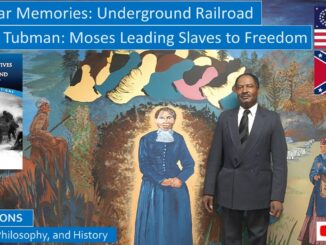
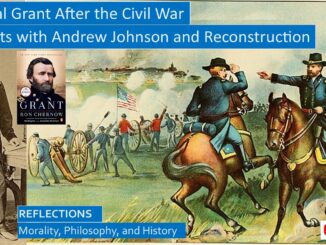
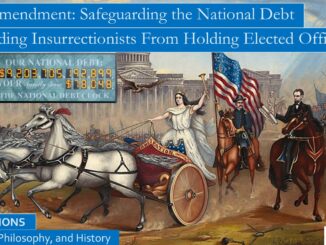
1 Trackback / Pingback